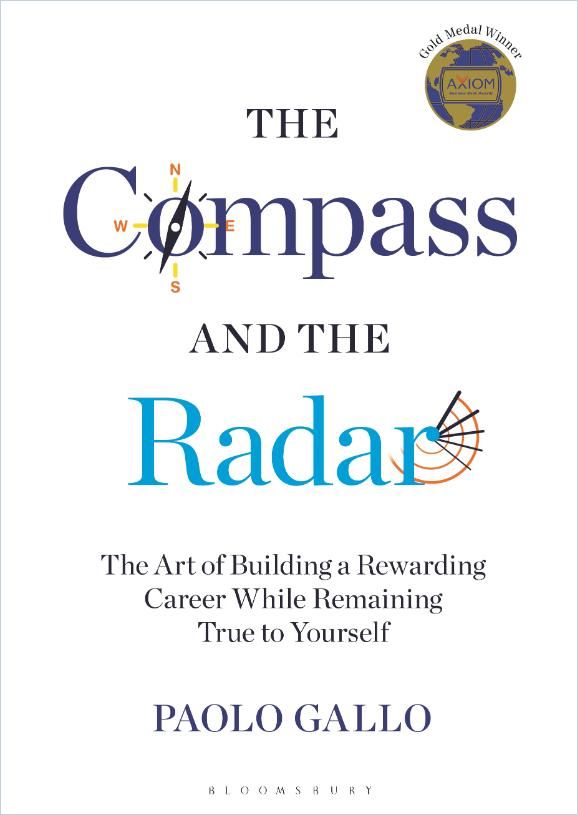Human resources expert Paolo Gallo offers career guidance through the prisms of staying true to your values and developing tactical understanding.

True to Yourself
Paolo Gallo served as chief human resources officer at the World Economic Forum and director of human resources at the European Bank for Reconstruction and Development. He applies his considerable skills and intelligence to the crucial question: What makes a job perfect for you?
Few people understand what motivates them or provides fulfillment in the workplace, argues Gallo. Identifying your core values – your inner “compass” – and developing an in-depth understanding of workplace dynamics and structures – your “radar” – improves your chances of finding, and thriving in, your ideal job, he insists. Gallo applies his personal experience and wisdom from a variety of sources to offer practical help and insights.
Vicki Culpin, author of The Business of Sleep, said of Gallo’s book, “It is witty, thought-provoking and deeply personal, and it changed the way I think about who I am and what I choose to do.” Dave Ulrich, author of Human Resource Champions, found that, “Gallo’s work offers thorough and thoughtful insights on managing one’s career. His questions lead to deep thinking; his tools offer outstanding solutions; and his examples inspire confidence.”
Values and Motivations
Gallo defines his title by explaining that by consciously applying your “compass” – your values and motivations – and your “radar” – your cultivated understanding of the opportunities and obstacles within the workplace – you can achieve success, as defined by what is most important to you.
Only by choosing and building a career aligned with our values, our goals and our deepest motivations, will we be able to do great work and consequently have success and rewards.Paolo Gallo
The author urges you to identify what matters most to you, what kind of work you do well and what tasks give you pleasure. Gallo is a pragmatist. He warns that success hinges on understanding and adapting to the social elements of each workplace.
Interviews
Gallo reminds you that the point of an interview is not only to get the job, but to gain understanding of what the job entails and of its working environment.
Read the list of people promoted in the last two years. If it makes you sick, you’re in the wrong place.Paolo Gallo
The author believes you must ask why the person who last held the job you are pursuing left the position and how the organization rewards employees. If a person leaves a job due to a promotion, Gallo regards that as a good sign. If the person resigned or got fired, he says to find out why. He further instructs you to understand the organization’s incentive system – do salaries increase on a schedule or does the company pay bonuses for hitting certain targets?
Strategy
Gallo advises approaching your job hunt like a job. He wants you to evaluate the likelihood of getting a given position. Create a well-crafted CV, he recommends, and avoid amateur mistakes like typos or inaccuracies.
The author encourages you to prepare thoughtful answers for interview questions like, “What are your strengths and weaknesses?” Most employers, Gallo says, want to gauge your emotional intelligence, that is, your self-awareness, ability to manage emotion, motivation, capacity for empathy and social skills.
Trust
Gallo maintains that success hinges on trust: getting others to trust you, and – more crucially, he makes plain – identifying the trustworthiness of your new bosses and colleagues. The author argues that a cooperative approach to salary negotiation – soliciting help from your future boss – generates win-win solutions. Gallo is adamant that after you accept a new job, you must leave your old one with grace.
Trust is not something that one owns but something that is built, maintained and learned.Paolo Gallo
Gallo offers a list of helpful behaviors in a new job: Show willingness to help your subordinates; don’t act superior; avoid real and perceived conflicts of interest; don’t be arrogant; under-promise and over-deliver; be empathetic and authentic; listen to people’s words, their tone and the emotions behind their words; and understand others’ points of view. Most of Gallo’s list is crushingly obvious, but, every item on it is worthy, and taping this list to the inside of your desk drawer might prove helpful.
Gallo prompts you to maintain a good relationship with your boss by observing your boss’s management style and personality. The author realistically notes that you must “never outshine the master.” Again returning to the obvious, Gallo reminds you that some bosses are good, some are jerks and others are fools. You can’t control their behavior, he asserts, only your own.
Price
Gallo returns to hard-nosed realpolitik when he writes that cost-free careers don’t exist. He teaches that everyone pays for their choices and stresses that a life devoted to work is hardly worth living.
Today is the right day to have lunch with the person we love…Life is now.
Paolo Gallo
Gallo moves more into self-help when he acknowledges that people want a sense of purpose, recognition for their efforts, autonomy and opportunities for growth. He cautions that if you leave a job for a flashier title or bigger salary, you will likely find disappointment. Gallo underscores that career advancement is only one definition of success, and often the least apt.
Let’s ask ourselves: What could we do if we weren’t afraid?Paolo Gallo
He again tells you to consider what gives value to your life: relationships, health, purpose, love of work, opportunities to learn, building self-awareness and the belief that what you do matters all offer far greater feelings of success than any job title.
Directness
Gallo brings a refreshing, cynical directness to the well-trod arena of how to find, interview for and thrive in a new job. Happily, his native intelligence and mordant wit balance his tough tactical sense and willingness to speak almost harshly to his audience. Gallo writes for fast reading and easy retention. Even when his advice seems obvious, his amused and amusing tone gives it a new relevance. The author does not vest in platitudes or sentimentality, but he does consistently urge you to find moral purpose in your work. Gallo’s unusual combination of attitudes and skills make this a singular, truly helpful job-hunt manual.
Other works on finding your perfect job include, of course, What Color Is Your Parachute? by Richard N. Bolles; Do What You Are by Paul D. Tieger; It’s Your Future by Charles G. Bird and Strategize to Win by Carla A. Harris.





